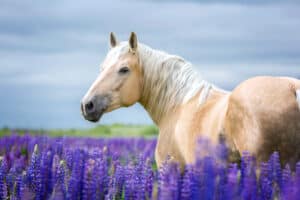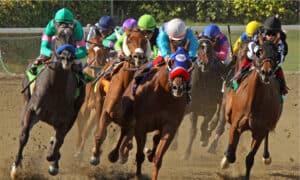
Have you ever wondered how the regal horses became such an integral part of humans and its prices? Research shows that human-horse interactions may have begun over 5,000 years ago. Actual timelines for the first instances of domestication are recorded around 3,500 BC.
Horses found their way to the Near East in 2,300 BC and were initially used for transport during war and hunting. Their ability to travel fast and cover long distances was a fantastic solution to traveling on foot. The emergence of chariots around 2,000 BC made the horse an important part of warfare. The invention of the stirrups and saddles marked the beginning of equestrianism.
Since then, the role of the horse has expanded to recreational purposes. Its beauty, athleticism, and healing effects have made it wonderful companions to those who can afford them. However, buying and keeping a horse is nowhere near the average cost of most domesticated animals and pets. Let’s explore horse prices, taking into account purchase costs, supplies, food, and more.
1. Purchase Cost of a Horse
How much you will spend on a horse depends on the breed and pedigree. The pickings are plentiful as there are over 350 pedigrees available. A horse’s average purchase cost is anywhere between $1,000 to over $10,000. Here are some of the factors that may influence horse prices:
The Use of the Horse
It’s good to consider why you’re purchasing the horse in the first place — are you buying it:
- For recreational purposes?
- To serve as a show horse?
- To help you with work around the ranch?
- To race?
On average, a racehorse costs more than a workhorse. For the former, the breeding and bloodlines are specific toward racing. Plenty of time goes into extensive development and training to condition the horses for competitive racing. A horse that has, over the years, shown remarkable progress on the track is often on high demand, thus attracting very high prices.
Strength and stamina should be key considerations for buying a workhorse. Although slow, their power and strength are vital in building, transportation, and other heavy tasks.
Pedigree
The second consideration that significantly affects the purchase cost is the pedigree, a closer look at a horse’s ancestry, lineage, and breeding history. An in-depth review of the horse’s records will reveal pertinent information like parentage, a means for tracing the horse’s roots back to their grandparents and beyond. Think of it like developing a very detailed family tree of the horse.
So, why is it important to know the horse’s pedigree before buying it? The reasons are numerous, including the following:
- A pedigree is a unique identifier that provides specific information on the horse’s parentage.
- The pedigree provides bloodline information, with the most significant being genetics. It will help you know the horse’s traits, abilities, and strengths. This point ties in closely with why you are purchasing a horse in the first place. If it is for racing, you want a horse whose genetics show athleticism, tenacity, speed, etc.
- Knowing the pedigree for the best outcome is important if you’re buying a horse for breeding purposes. You get information on factors like performance, quality, and desirable traits. Pedigree information is also necessary for documentation, as breeding animals must meet specific criteria.
- The pedigree determines the value of the horse. Those with successful performance records, unique ancestry, or good performance in specific areas will command higher prices.
A closer look at some of the most expensive horses will take your breath away. The 2,000 Kentucky Derby winner Fusaichi Pegasus was purchased at a whopping $70 million. Two years earlier, the Triple Crown winner, Justify, commanded a price tag of $60 million. Its strength was its pedigree, which largely revolved around speed. Its performance history and bloodline made it a highly-sought after commodity amongst breeders.
Training and Development
The intended purpose of a horse determines the training and development that will go into it. A lot goes into shaping the mental, physical, and skills for optimal performance. The training also ensures a harmonious partnership between the handler and the horse.
- Foundation training teaches the horse basic skills and obedience techniques.
- Conditioning and fitness training to build up the horse’s stamina, flexibility, muscle strength, and more.
- Technical maneuvers and skills training, depending on what you want to use the horse for. For instance, a racehorse must learn skills like stride lengths and racing techniques. Workhorses learn work-related tasks, harness work, pulling, herding, and more.
- Exposure and desensitization training gives the animal greater confidence in different environments.
- Progressive challenges and refinement is a gradual process that slowly introduces complex scenarios to better understand how well the horse develops its skills and abilities.
- Mental and emotional well-being training helps the horse establish better relationships with humans. It comes in the form of positive reinforcement, clear communication, and more to help build trust.
All this training and development takes time and resources, thus impacting the final cost of the horse.
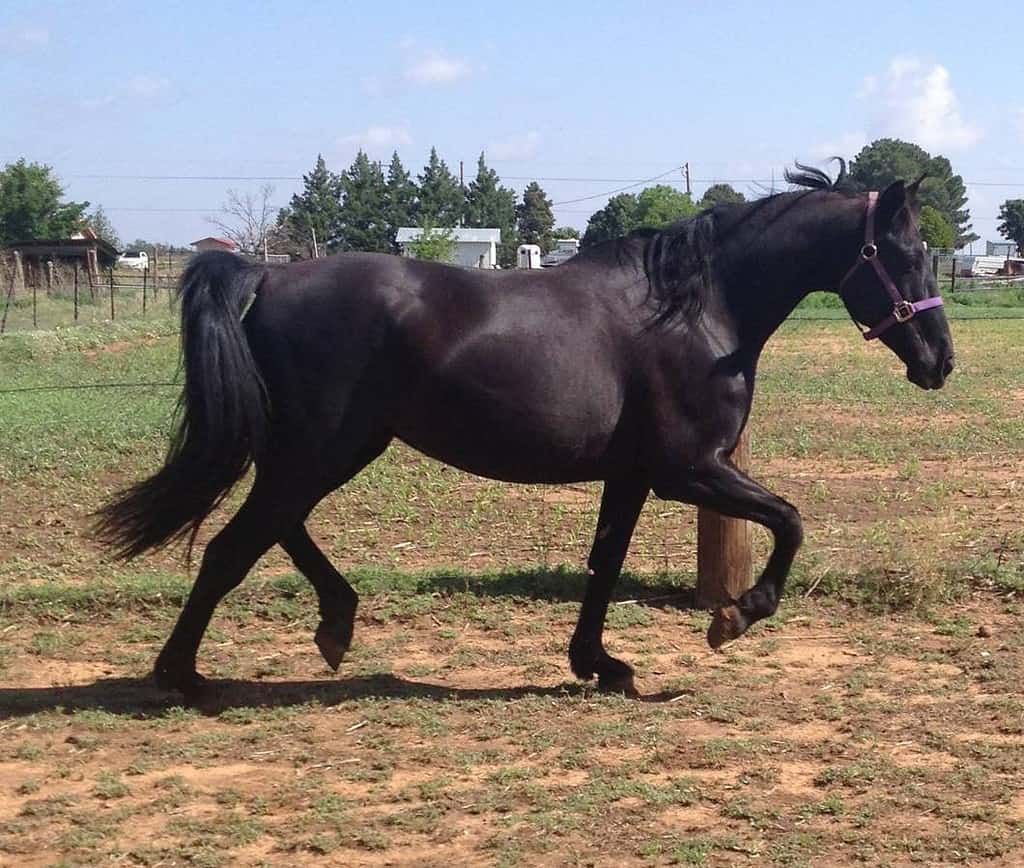
The intended purpose of a horse determines the training and development that will go into it.
©Gaitedhorse / CC BY-SA 4.0 – License
2. Buying a Horse
There are many places you can purchase a horse from:
The Internet
It’s one of the most popular places to buy a horse. When searching for a horse, be clear on the breed, price range, age, and other requirements. A word of caution, though; not all sellers are honest about the animal they’re selling. Please avoid giving out your hard-earned cash before seeing the horse.
Reputable Trainers or Breeders
The best place to buy a horse is from reputable trainers or breeders. Their reputation matters greatly; they’re the least likely to engage in underhand deals. Moreover, you get good records of pedigree, health, and horse history. Although you’re bound to spend more, you can rest assured that your money is not going to waste.
Horse Auctions
Horse auctions are not uncommon and attract thousands of buyers annually. However, you should approach it with the same caution as a car auction. If you don’t know what to look for, it can be hard to find a good horse. There may also be little information on the animal’s personality history or health records. Carry along a trained professional to help with the purchase.
Horse Dealers
Horse dealers are like car dealers — not all are reputable, yet you can find some good deals if you inquire deeper. You want your mechanic to help you choose the right car, right? How about you apply the same level of caution by trusting a trained professional to help you pick the right horse?
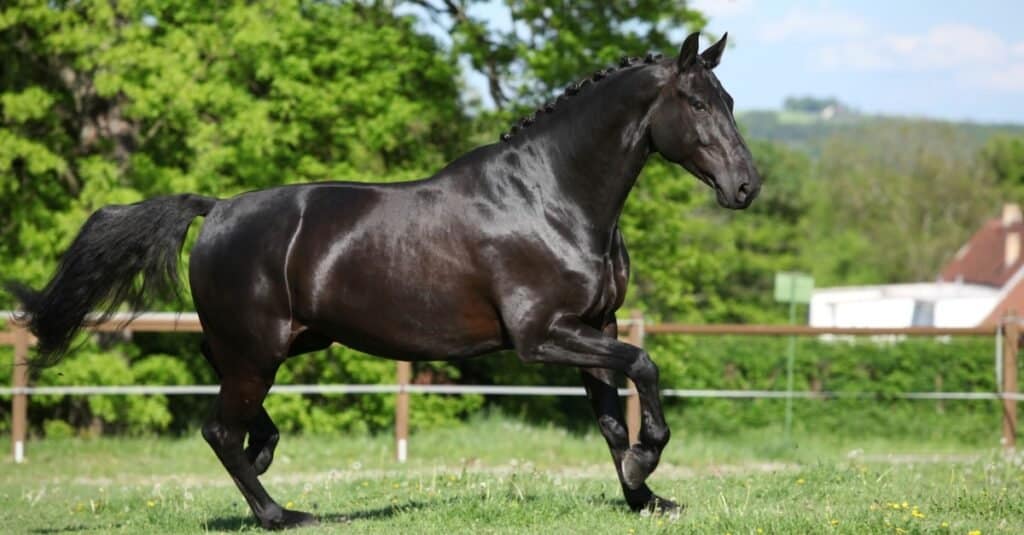
The best place to buy a horse is from reputable trainers or breeders.
©Zuzule/Shutterstock.com
3. Cost of Keeping a Horse
Parting with a few thousand dollars to purchase a horse is just the beginning. These majestic creatures are what many would consider a high-maintenance animal. Food, supplies, shelter, and healthcare should cost you a pretty penny; we’re talking upwards of $6,000 for food, boarding, and equipment.
However, your lifestyle may determine how much you will spend on maintenance costs. Here are two examples:
- Shelter: If you live in the city, you may spend more than the rural horse owner to get a suitable stable and buy hay.
- Equipment and supplies: You’re bound to spend a lot more on some horse products and supplies. If you want your horse’s fur coat to stay glossy for longer, you won’t hesitate to buy some of the best horse shampoos and conditioners. That’s fine if you can afford it. Those who can’t may settle for cheaper, less-advertised products, which may work just as well.
It’s, therefore, impossible to give a specific dollar amount to how much it will cost to keep a horse. Here’s a breakdown of what you can expect to spend annually.
Food – $2,500 plus
Maintaining a horse’s build and stamina takes plenty of food. The average horse can grow to over 1,000 pounds and eat 1.5 to 2% of its body weight, translating to about 1.5 to 2 kg of food for every 100 kg. Food consumption increases significantly in cold weather to help the animal cope with frigid temperatures.
If you go for good quality feed, expect to spend no less than $40 for a 500-pound bag. Feeding 2.5 pounds of horse feed to a 1000-pound horse twice daily will deplete the pack in about ten days. In the long run, that won’t weigh you down financially.
Other food-related expenses to consider include:-
- Forage, which can cost between $5 to $20 for 50 pounds, depending on the quality, location, and availability.
- Concentrates for additional nutrition; this should be a priority, especially for horses with specific dietary needs or high energy requirements. A 50-pound bag of concentrate can cost anywhere between $10 to $40.
- Supplements for an extra mineral and vitamin boost. The cost could go well over $100 per month, depending on the brand or type.
You must also ensure the availability of clean, fresh water that’ll impact the upkeep cost.
Housing – $100 to Over $24,000 Per Annum
If you live on a ranch, you may already have stables or barns to board the horse. On-site housing is more convenient and less costly in the long run. But, you must still take care of basics like cleaning, equipment, and other management practices.
Commercial facilities are more expensive, although they make it easier to manage the horse. The service providers typically take on the day-to-day care of the animals. The cost covers food, stall cleaning, vet service, farrier services, and other daily operations. Some commercial facilities allow homeowners to take on some horse management tasks themselves. That can reduce how much you pay in the end.
Basic equipment – $1,500 And Above
Quality horse upkeep means investing in the right equipment. These include:-
- Saddles
- Bridles
- Halters
- Bits
- Lead ropes
- Grooming equipment such as buckets, shampoos, conditioners, and brushes
- Essential gear and clothing like helmets, half chaps, trail riding tacks, etc.
If you’re stocking up for races or horse shows, get ready to spend significantly higher amounts.
Healthcare and Insurance – $200 -$1000 per Annum
Veterinary costs are a must-have item in your horse upkeep budget. Your horse will need the following:
- Two annual vaccinations.
- Deworming every six to 8 weeks.
- Teeth are rasping/floating once a year.
- Other issues like colic or lameness will cost more than $1,000.
Mortality, illness, and accident insurance are also worth considering. The underwriters look at the horse value to determine how much you’ll pay in premiums.
Farrier Services: $30 To $150 per Visit
Farriers provide a whole list of services, including:
- Hoof trimming to maintain the health and balance of the horses.
- Shoeing, especially for animals that walk over hard services.
- Shoe removal if it’s no longer necessary for the horse to wear them.
- Corrective shoeing to address specific gait or hoof issues.
- Hoof care assessment and maintenance to identify or mitigate any potential problems. These include lameness, infections, or signs of diseases.
The farrier visits depend on the horse’s workload, growth rate, and individual needs. On average, expect to see a farrier at least once every 6 to 8 weeks.
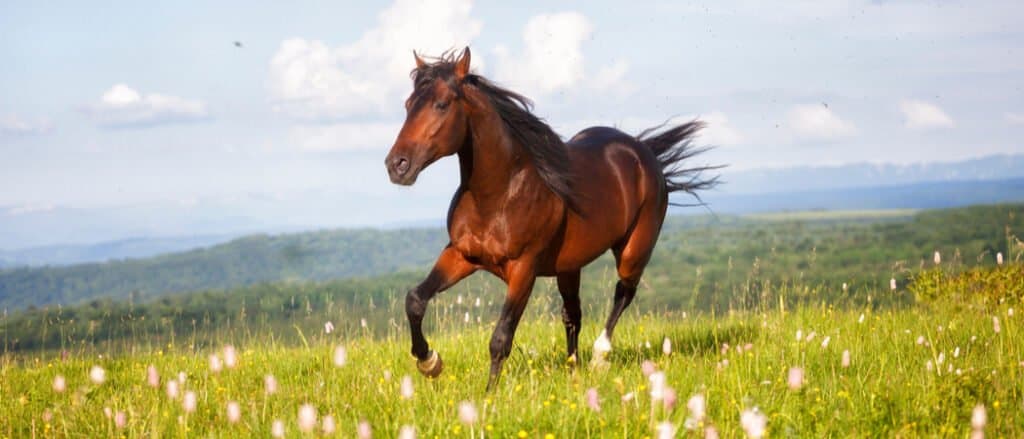
The cost of keeping a horse is a long term commitment.
©Shchipkova Elena/Shutterstock.com
What People Don’t Tell You About Caring For A Horse
The Good
Owning a horse can be an incredibly rewarding and fulfilling experience. These beauties are excellent companions who can develop strong bonds with their owners. Some people gain emotional support from horses that they rarely find in people. Equine-assisted therapy utilizes the calm nature of horses and helps people deal with various emotional, physical, and cognitive challenges.
Few pleasures beat jumping onto your horse and feeling the vibration of muscle power as you ride. There isn’t a better way of connecting with nature than on the back of a horse. Other equestrian disciplines like dressage, jumping, or trail riding further add to the enjoyment of owning a horse.
Also, if you want to break a sweat, caring for a horse will give you all that. Mucking stalls, grooming, riding, and lifting bales of hay will serve as healthy doses of exercise.
The Bad
Let’s start with the most obvious: the cost aspect of buying and keeping a horse. That puts it out of the reach of many people who would love to own one. Luckily, many places offer opportunities for horse lovers to spend time with the animals.
Take time to care for your horse or pay someone if you can’t. Daily activities include stall cleaning, feeding, watering, exercise, and more. Maximum physical labor goes into the process, which can take a toll on some people. And yes, forget about impromptu plans like vacations without fitting the horse into your schedule. Like hiring a babysitter for your little one, you must have someone on standby for the horse.
Don’t expect to own a horse without getting emotionally attached. Looking into those beautiful eyes will melt the hardest heart. And that in itself can be a negative aspect of owning a horse. Any sickness, injury, or death can greatly affect your emotional well-being.
You must also invest in learning how to handle the horse. It’s an animal that is extremely powerful and can be unpredictable sometimes. That can place you at significant risk of injury if you use the wrong techniques.
So Much to Know About Horses, Costs, and More
Consider buying a horse as a long-term investment; it’s great to have, can bring in a tidy sum (depending on pedigree), and serves as an excellent relaxation companion. You should, however, take good care of it to enjoy a good return on investment.
The photo featured at the top of this post is © Kira Felicitas/Shutterstock.com
Thank you for reading! Have some feedback for us? Contact the AZ Animals editorial team.




